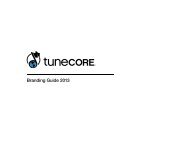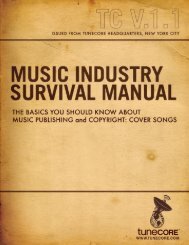Music Industry Survival Manual.pdf - TuneCore
Music Industry Survival Manual.pdf - TuneCore
Music Industry Survival Manual.pdf - TuneCore
Create successful ePaper yourself
Turn your PDF publications into a flip-book with our unique Google optimized e-Paper software.
Finally, Joe will provide you opportunities to market your watch in the store.<br />
For example, it will be displayed up front when people walk in.<br />
In return for all these services, Joe asks to be paid 25% of the money earned<br />
from each watch sale. If a watch sells for $10, Joe will get paid $2.50 and you<br />
get the rest.<br />
This is the music industry – only instead of watches, it’s CDs, and record labels<br />
hire people to make their “watches”.<br />
it’s about distribution and shelf space<br />
The music industry is about distribution. Record labels make the “thing”<br />
to give to the distributor. The distributor puts the “thing” in the store. The<br />
record label then markets the “thing” to create demand.<br />
Stores have a limited amount of shelf space and can only have a limited number<br />
of CDs in stock. If a CD is not on a shelf, it cannot sell. Therefore, having<br />
a powerful distributor is important as it can force CDs onto the shelves (but<br />
the little guys get shoved to the side).<br />
Digital stores like iTunes, Napster, Rhapsody, e<strong>Music</strong>, etc., have changed all<br />
this. To start, they have unlimited shelf space. This means everything can be<br />
in stock.<br />
In addition, digital stores are never out of stock – they have virtual unlimited<br />
inventory that is replicated on demand. No more need to make CDs and ship<br />
them to a warehouse and then re-ship them to a store in hopes the store<br />
takes it out of a box and puts it on a shelf. Instead, the music is delivered once<br />
to a server and then sits there until someone buys it. It can be found instantly<br />
whenever a customer searches for it. When it is bought, the buyer gets a<br />
perfect digital copy of the original—nothing comes off the shelf, it’s still there<br />
for the next customer to find and download.<br />
In the old model, every CD in a store can be returned at any time for a full<br />
refund. A sale in the digital world cannot be returned. You know exactly what you<br />
sold with no concern of dreaded “returns.”<br />
These three changes: unlimited shelf space, unlimited virtual inventory and no<br />
returns, make the big warehouses and sales staff obsolete. This means that the<br />
four major labels – A.K.A. the four major distributors – have invested tens of millions<br />
of dollars into a soon to be obsolete infrastructure as now it’s just a matter<br />
of getting your music and art digitally delivered once to a store like iTunes.<br />
So who gets access to digital distribution, and under what deal terms<br />
keeping your rights and getting all the money<br />
from the sale of your music<br />
aggregators<br />
Companies called “aggregators” have sprung up offering artists and bands access<br />
to the digital stores. It’s a valuable service but the price they demand is out of<br />
date, old school and exploitive.<br />
First, they demand exclusive control of your master recordings (digitally) – like a<br />
record label - for a period of time (called a Term), usually three to five years.<br />
Unlike a record label, they do not: advance you money to record; provide you<br />
tour support; help you find a studio, record, mix and master an album; mail out<br />
posters to gigs; run print or banner ads; hire independent radio promotion and<br />
mail out the CDs to radio; hire a publicist and mail out the CDs to magazines; help<br />
you make your art; front the money and make stickers and buttons; pay for band<br />
photos; pay for the manufacturing of your CDs; provide you CDs to sell at your<br />
gigs and many, many, many other label functions.<br />
Second, just like a physical distributor, they take a percentage of the money you<br />
earn from the sale of your music each time your music sells.<br />
But, unlike a physical distributor they do not: pick, pack and ship orders; have a<br />
warehouse staff; insure inventory; have a national sales staff; advance you money<br />
3 4






